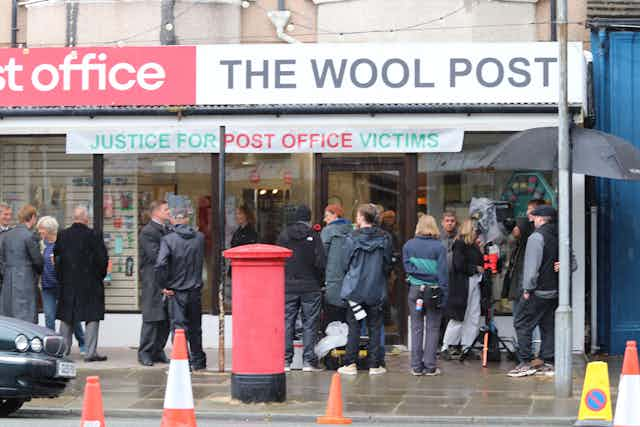In the wake of British broadcast ITV airing its four-part drama, Mr Bates vs The Post Office, new legislation has been tabled, former Post Office boss Paula Vennells has handed back her CBE and, for the first time, Fujitsu, the company behind the faulty IT system at the scandal’s heart, has admitted it should contribute to compensation for the victims.
The question that won’t go away is why it has taken a TV drama for the wheels of justice to really start moving.
News outlets, podcasts, political commentators and MPs have been galvanised into action after, as ITV revealed on January 9 2024, 9.2 million viewers tuned in to watch the drama. The scheduling and the audience profile go some way to explaining why it has had such an impact. So too, does the drama being closely aligned with social realist approaches to cinema.
My doctoral research into British social realism looks at how individual characters are constructed and represented in film. Mr Bates vs The Post Office follows the plight of characters facing a social problem filmed in a naturalistic manner. Crucially, much like Ken Loach’s 2016 film, I, Daniel Blake, it has generated not just public attention but also activism.

How realism connects with the viewer
Directed by James Strong and written by Gwyneth Hughes, Mr Bates vs The Post Office tells the story of the Post Office Horizon IT scandal that left hundreds of sub-postmasters with accounting errors between 1999 and 2015. The long-respected institution claimed these were solely their responsibility, resulting in private prosecutions, debt, bankruptcy and, tragically, suicides.
The drama focuses on conventional aspects associated with social realism: injustice, law and order and poverty. Sub-postmaster Lee Castleton (Will Mellor) is privately prosecuted. The bankruptcy he suffers as a result of losing that case and being required to pay legal fees for the Post Office, affects his home life, his relationships and his mental health.
There are hard hitting sequences, showing Castleton and many other characters reaching breaking point. One character takes their own life. These are scenes that remain with the viewer long after the programme has ended.
While the realist element of the drama is not as strong as its social aspect, the camera is deployed in a way reminiscent of Loach. It lingers as an observer in the lives of these characters. Similarly, in I, Daniel Blake, the camera observes from a distance as Daniel comes up against structures of inequality and injustice. This offers a visceral insight into the torturous ordeal that ordinary people face.
While many critically acclaimed social realist films, such as This is England, Fish Tank and The Selfish Giant, share subtle political nuances with the ITV drama, it is in Loach’s oeuvre that it finds greatest resonance. His films, including Sorry We Missed You (2019) and The Old Oak (2023), adopts recognisable authentic characters in familiar locations. This convention of Loach and other social realist filmmakers, allows the audience to understand a broader range of socio-economic and cultural issues in society.
In my research, I have shown how realism can articulate a relationship between an individual and the social world. It activates a mise-en-scène (a film studies term about the arrangement of props and scenery on set) of memory, recognition and familiarity. It solidifies the images and narratives on screen in the minds of the viewers. Much like Daniel Blake, and This is England’s Shaun Fields, the Post Office drama’s characters are relatable: the viewer can compare their experiences with those on screen.
Blake is constructed to be an honest person, who, despite his health issues, has to find work due lack of communication between health professionals and the benefits system. So too, the regular and hardworking people, in Mr Bates vs The Post Office become victims of a system that does not communicate effectively, severely affecting their wellbeing.
Furthermore, as opposed to a faceless person in a news article or subject in a documentary, the actors involved in the drama – Toby Jones, Julie Hesmondhalgh, Shaun Dooley, Will Mellor, Ian Hart, Monica Dolan – are all familiar to the British public. Through their history with national television, and the diverse regional representation they achieve, their presence further enforces the drama’s “this could happen to you” narrative.
How scheduling and audience profile matters
Of course, the show also benefited from a well-placed slot in the Christmas/new year schedule. It was broadcast on consecutive days and also uploaded to ITV’s streaming site, ITVX. This both catered to binge culture (where viewers watch several episodes in one sitting) and kept the momentum going, allowing the story to embed itself in the minds of viewers.
According to OfCom, ITV boasts an eclectic audience, but most viewers are over 55 and from working class backgrounds. This means they’re mostly watching the drama from a working-class perspective, with experiences that chime with those represented on screen.
Research has long shown that, due to changing consumer behaviour and falling sales revenue, traditional media including newspapers and magazines are no longer able to capture the public attention in the same way this drama has.
Conversely, social realist projects have brought about real change. The public debate prompted by Loach’s I, Daniel Blake led to a discussion in the House of Lords, on how claimants were being treated by the social security system.
The show’s writer Gwenyth Hughes has spoken at length about her investigative approach to writing what she underlines is a true story: “If you want to really get people’s attention, tell them a story. And in this case, a true story.” Mr Bates vs The Post Office is a vital reminder of the power of fictional storytelling, rooted in real life, to give voice to ordinary people who have been marginalised and ignored.

Looking for something good? Cut through the noise with a carefully curated selection of the latest releases, live events and exhibitions, straight to your inbox every fortnight, on Fridays. Sign up here.

